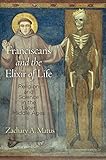Franciscans and the Elixir of Life : Religion and Science in the Later Middle Ages / Zachary A. Matus.
Material type: TextSeries: The Middle Ages SeriesPublisher: Philadelphia : University of Pennsylvania Press, [2017]Copyright date: ©2017Description: 1 online resource (216 p.) : 2 ilusContent type:
TextSeries: The Middle Ages SeriesPublisher: Philadelphia : University of Pennsylvania Press, [2017]Copyright date: ©2017Description: 1 online resource (216 p.) : 2 ilusContent type: - 9780812249217
- 9780812294064
- 940.2 23
- online - DeGruyter
- Issued also in print.
| Item type | Current library | Call number | URL | Status | Notes | Barcode | |
|---|---|---|---|---|---|---|---|
 eBook
eBook
|
Biblioteca "Angelicum" Pont. Univ. S.Tommaso d'Aquino Nuvola online | online - DeGruyter (Browse shelf(Opens below)) | Online access | Not for loan (Accesso limitato) | Accesso per gli utenti autorizzati / Access for authorized users | (dgr)9780812294064 |
Browsing Biblioteca "Angelicum" Pont. Univ. S.Tommaso d'Aquino shelves, Shelving location: Nuvola online Close shelf browser (Hides shelf browser)

|

|

|

|

|

|

|
||
| online - DeGruyter Food on the Page : Cookbooks and American Culture / | online - DeGruyter Dark Speech : The Performance of Law in Early Ireland / | online - DeGruyter Contested Bodies : Pregnancy, Childrearing, and Slavery in Jamaica / | online - DeGruyter Franciscans and the Elixir of Life : Religion and Science in the Later Middle Ages / | online - DeGruyter Modern Coliseum : Stadiums and American Culture / | online - DeGruyter Jews, Gentiles, and Other Animals : The Talmud After the Humanities / | online - DeGruyter Disability, Human Rights, and Information Technology / |
Frontmatter -- Contents -- Introduction -- Chapter 1. Franciscans and the Sacral Cosmos (The Context of Franciscan Alchemy) -- Chapter 2. Three Elixirs -- Chapter 3. The Apocalyptic Imperative -- Chapter 4. A Subjunctive Science -- Conclusion -- Notes -- Works Cited -- Index -- Acknowledgments
restricted access online access with authorization star
http://purl.org/coar/access_right/c_16ec
One of the major ambitions of medieval alchemists was to discover the elixir of life, a sovereign remedy capable not only of healing the body but of transforming it. Given the widespread belief that care for the body came at the cost of care for the soul, it might seem surprising that any Franciscan would pursue the elixir, but those who did were among its most outspoken and optimistic advocates. They believed they could distill a substance that would purify, transmute, and ennoble the human body as well as the soul. In an age when Christians across Europe were seeking material evidence for their faith and corporeal means of practicing their devotion, alchemy, and the elixir in particular, offered a way to bridge the terrestrial and the celestial.Framed as a history around science, Franciscans and the Elixir of Life focuses on alchemy as a material practice and investigates the Franciscan discourses and traditions that shaped the pursuit of the elixir, providing a rich examination of alchemy and religiosity. Zachary A. Matus makes new connections between alchemy, ritual life, apocalypticism, and the particular commitment of the Franciscan Order to the natural world, shedding new light on the question of why so many people claimed to have made, seen, or used alchemical compounds that could never have existed.
Issued also in print.
Mode of access: Internet via World Wide Web.
In English.
Description based on online resource; title from PDF title page (publisher's Web site, viewed 26. Aug 2020)


